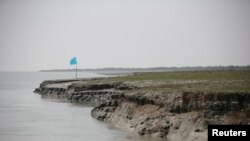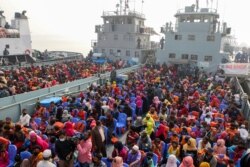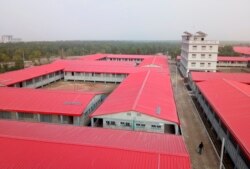More than two dozen Rohingya are missing and feared drowned after their boat sank August 14 in the Bay of Bengal while they were fleeing a refugee settlement located on a remote Bangladeshi island.
The refugees, living on the island of Bhasan Char, have long said they do not want to live there, and the drowning incident underscores their desperation to flee the island.
The Rohingya who drowned were apparently trying to sneak back to Cox’s Bazar where they had lived in the world’s largest refugee camp, before being relocated to Bhasan Char, police and other officials said.
“We are devastated that reportedly many passengers, including women and children, have tragically drowned. The confirmed number [of the drowned] is not yet known,” Hannah Macdonald, a spokesperson for the United Nations Refugee Agency (UNHCR), told VOA in an emailed statement.
Police reported August 15 that 14 Rohingya were rescued from the sea by fishermen and about 25 Rohingya remain missing following the boat tragedy. However, the Rohingya sources said that as many as 40 Rohingya may have drowned in the tragedy.
"We have known from Rohingya sources in Bhasan Char that there were around 50 refugees in the boat that sank on Sunday (August 15). They were coming to Cox's Bazar. After the boat capsized in the sea, some Bangladeshi fishermen rescued 14 Rohingya,” Mohammad Hossain, a Cox’s Bazar-based Rohingya community leader, told VOA on Friday.
“We estimate 35 to 40 Rohingya drowned that day," he said.
Fleeing persecution and violence, in 2017, nearly one million Muslim Rohingya fled Myanmar for Cox’s Bazar in Bangladesh, where the refugees live in squalid and overcrowded camps.
Bangladesh says it wants to ease congestion in the Cox’s Bazar camps and so the government set up a facility on the remote uninhabited Bay of Bengal island of Bhasan Char, to house about 100,000 Rohingya refugees.
When the authorities were building the housing facility on Bhasan Char, international rights groups called on Bangladesh to halt the process of the relocation, questioning the suitability of the island to host the people.
Yet, in several batches, Bangladesh has relocated over 19,000 refugees to Bhasan Char since last year. Rights group reports said that many Rohingya were coerced to move to the island.
Since their arrival on Bhasan Char, though, the refugees complained that they were living in jaillike conditions, with very poor amenities. Many said they had no freedom to visit Cox’s Bazar to see their relatives. In September, an Amnesty International report alleged sexual assault of Rohingya women by police and navy officials on the island.
Last year, the refugees on Bhasan Char even resorted to a hunger strike, demanding that they be returned to Cox’s Bazar. In the past two months, several dozen Rohingya managed to secretly flee the island by boat. Some of them were caught by police on the mainland of the country and sent to jail.
A Rohingya man from Bhasan Char told VOA Bangladesh authorities “did not keep their word,” regarding relocation incentives.
“Before we came to Bhasan Char, the authorities promised to give us land for agriculture, goats, cows, etc., in the island. They also promised to give us a monthly dole in cash. But they did not keep their word. We have no job, no income here. This is the reason the Rohingya are desperately seeking to flee this island and many are dying in the sea,” said the man, who asked not to be named for fear of reprisals.
Medical facilities for the refugees are very poor on Bhasan Char, a Rohingya woman based in Cox’s Bazar who has some relatives on the island told VOA on Monday.
“There is no good hospital in Bhasan Char. A seriously ill patient or a pregnant woman with labor pains has to be taken to a Noakhali hospital [on the mainland] by boat. It is a long and very risky journey for a serious patient,” she said.
“A few weeks ago, my nephew’s pregnant wife, suffering from labor pain, died in Bhasan Char [refugee settlement] before she could be taken to the Noakhali hospital. For Bhasan Char’s Rohingya, there is no other option to save their lives unless they jump in the sea and flee the island,” said the 62-year-old woman who asked not to be identified, fearing reprisal from authorities.
Mohammad Shahidul Islam, the police chief of Noakhali district, said in a written message on Sunday that his department was not aware of the death of any pregnant Rohingya woman in Bhasan Char.
“However, on August 12, an 8-month-old sick Rohingya baby died when he was being taken from Bhasan Char to the Noakhali hospital by boat,” Islam said.
Phil Robertson, deputy director of Human Rights Watch’s Asia division, said Bangladeshi authorities are blatantly violating Rohingya refugees' rights on Bhasan Char by depriving them of adequate food, medical care, education and access to livelihoods, and in doing so, violating the pledges Dhaka made when first proposing the island camp.
“The situation on the island has become increasingly desperate, so it is not surprising at all that the Rohingya are trying to escape what has become a de facto prison island. By restricting the refugees' rights to freedom of movement, the Bangladesh authorities are pushing the Rohingya into the hands of smugglers, whose boats are hardly safe, resulting in tragedies like the recent capsizing of the boat, and unnecessary loss of many lives,” Robertson told VOA.
“Sadly, as long as Bangladesh continues these rights-abusing policies, this will likely not be the last such tragic incident,” he said.
The government should prioritize safety and protection, and grant full freedom of movement for the Rohingya, including the right to leave and return to the island without limit, Robertson added.
“The refugees on the island are people who fled crimes against humanity and acts of genocide in Myanmar, and they should not be revictimized by Bangladesh's callous corralling of people on a prison island where services are lacking and security forces can abuse refugees with impunity,” he said.






